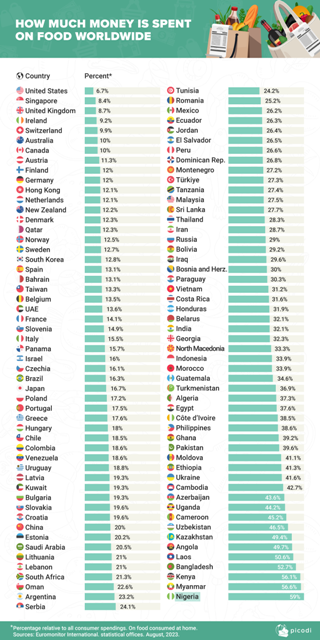
Statistics published by an international e-commerce organisation, Picodi, show that the average Nigerian household spends about 59 per cent of its income on food.
According to the data released in August, the researchers who analysed statistical data from 105 countries concluded that Nigerians’ expenditure of food is the highest in the world.
Nigeria ranked 105th out of the 105 countries analysed.
The report said food and non-alcoholic beverages make up 59 per cent of Nigerian’s spending on goods and services.
Comparatively, Nigeria’s situation is worse than other countries with high spending on food such as Bangladesh (52.7 per cent), Kenya (56.1 per cent), Myanmar (56.6 per cent), and Laos (50.6 per cent).
In contrast, residents in the US, Singapore, UK, Ireland, and Switzerland spend less than a tenth of their income on food and non-alcoholic beverages.
In the US, the figure is 6.7 per cent; Singapore, 8.4 per cent; the UK, 8.7 per cent; Ireland, 9.2 per cent; and Switzerland, 9.9 per cent. Heighten
Nigeria’s food inflation has been made worse by the federal government’s May 29 announcement of the removal of subsidy on petrol.
The country’s e food inflation increased to 24 per cent in July, thus compelling President Bola Tinubu to declare a state of emergency on food insecurity.

The highest food spending in Africa, the report said, can be found in Egypt ($114/month), followed by South Africa ($77/month) and Kenya ($74/month).
The report noted that an average Nigerian spends $62 (₦48,186) monthly on food. This amount is higher than Nigeria’s minimum wage of N30, 000 which some states have not even paid.
The lowest grocery spending can be found in Algeria ($51/month), Cameroon, ($45/month), Uganda ($24/month), Ethiopia ($20/month), and Tanzania ($15/month).
The researchers said they used the latest household food and non-alcoholic beverages consumption statistics from Euromonitor and official government websites.
For currency conversion, the organisation used the average exchange rate data from Google Finance for July 2023.
With Premium Times report

















































